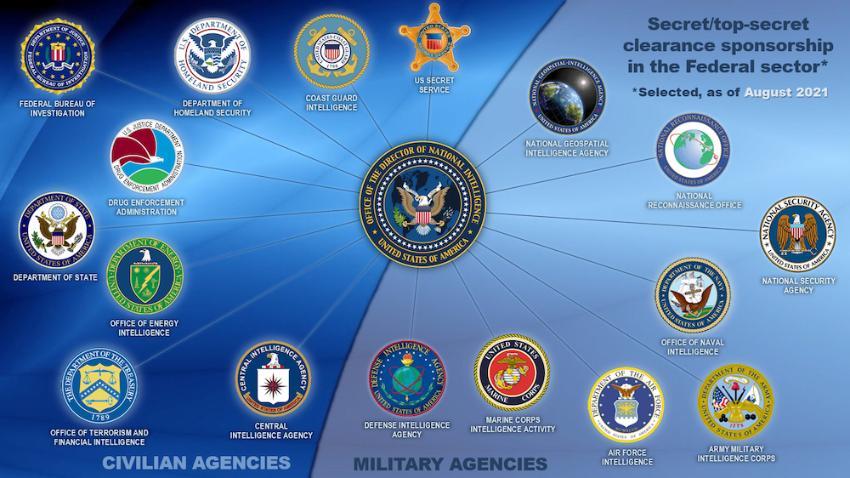THE INTELLIGENCE AND SECURITY STUDIES program has seen its students succeed in at all levels of government, as well as wide-array of private security organizations, corporations, and non-governmental organizations. As an illustration, the graphic below indicates the organizations of the U.S. Intelligence Community where our graduates have found success in internship and career placement.

There are several reasons for this success:
· Every year, students in our program refine their skills in crafting resumes, interview techniques, and submitting applications for internships, scholarships and entry-level jobs in the field.
· Additionally, our students’ background in, and knowledge of, intelligence and security issues and practices helps them stand out in the selection process, as their resumes tend to feature the terminology and language that selection committees are looking for.
· More importantly, our students’ degree is distinctive and uniquely relevant to the professions for which they are applying. It therefore makes them stand out from other candidates.
For many of these same reasons, our alumni who pursue graduate education have also found success. They have pursued masters and doctoral level degrees at such institutions as Georgetown University, Johns Hopkins University, American University, the University of Chicago, the University of South Carolina, and the University of Manchester (UK).
Select Course Descriptions
INTEL 312 Intelligence Operations. This course is a survey of the limits, possibilities, and ethical dilemmas for the conduct of operations in support of the intelligence community. The course examines operations related to the collection of intelligence information including espionage, interrogation, imagery analysis, communications intelligence, and counterintelligence. Operations that are designed to have a direct policy effect - covert operations, direct action, and information operations are also considered.
INTEL 337 Law Enforcement Intelligence. This course provides a comprehensive overview of the issues, functions, methods, and theories attendant to law enforcement intelligence operations, with an emphasis on the current law enforcement intelligence apparatuses in use in the United States. Topics include a review of basic intelligence processes, including collection, assessment, analysis, evaluation of source and data, dissemination, tasking, and management. The course will detail the history of the law enforcement community’s adoption of intelligence processes, the application of basic intelligence techniques in the law enforcement context, and review basic intelligence methodology. Other topics will include the examination of national intelligence models and the emergence of intelligence-led policing initiatives in the U.S.
INTEL 344 Weapons of Mass Destruction. This course examines the spread of nuclear, chemical, and biological weapons, as well as ballistic missiles. These systems taken together are commonly referred to as weapons of mass destruction, or WMD. Students learn what nuclear, chemical, and biological weapons and ballistic missiles are, and who has or might have such weapons. Students also study the actual and theoretical use of WMD by states and terrorists, consider their strategic value as instruments of national security, and grapple with problems of arms control, disarmament, and intelligence.
Placements
The Intelligence and Security functions of government require highly-skilled personnel with access to documents of a sensitive, confidential or classified nature. The intelligence program at CCU, with its cutting-edge courses and programs, has seen significant success in placing graduates in government posts that require these skills. Graduates from our program now work at numerous national and state-level intelligence and security organizations, such as the FBI, the State Department, the National Geospatial-Intelligence Agency, the National Counterterrorism Center, and the Secret Service.
Contact
Jonathan Smith
Chair
Intelligence and Security Studies Program
(843)349-6573
jonsmith@coastal.edu





